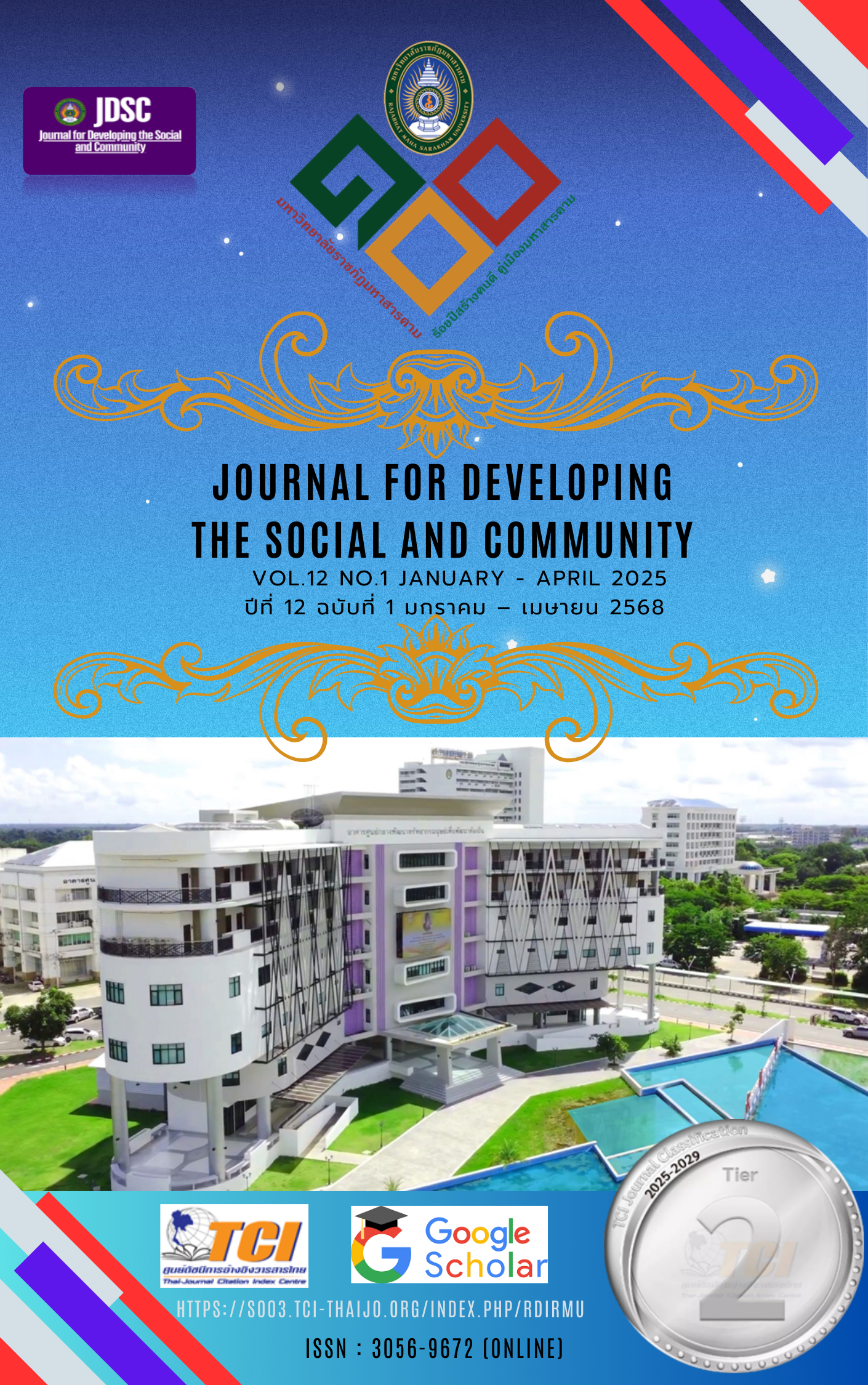Enhancing Geo-literacy through Geographic Inquiry Process : A Study of Mathayom 5 Students at Buddhakosat Wittaya School
Keywords:
Geographic Inquiry Process, Geo-Literacy, Systematic ThinkingAbstract
Abstract
Background and Aims: Geographic literacy (GEO LITERACY) is a fundamental knowledge for 21st-century learners, enabling them to seek knowledge and answer questions about the relationships of various elements on the Earth's surface. Developing students' ability to live as responsible global citizens is crucial, and it is essential to raise their awareness of geographic knowledge. This research aims 1) to Develop and assess the quality of a lesson plan designed to enhance Geo-Literacy among Mathayom 5 students at Buddhakosat Wittaya School, Phrae Province, through the Geographic Inquiry Process. 2) Compare the Geo-Literacy levels of Mathayom 5 students before and after learning through the Geographic Inquiry Process. 3) Examine the students' satisfaction with learning through the Geographic Inquiry Process.
Methodology: The sample group consisted of 22 students from Mathayom 5/1 at Buddhakosat Wittaya School, Phrae Province, in the academic year 2024. The sample was selected through simple random sampling using a classroom-based lottery method. The research instruments included 1) Seven lesson plans employing the Geographic Inquiry Process, 2) A situational Geo-Literacy assessment comprising 30 items, and 3)A student satisfaction questionnaire regarding the development of Geo-Literacy through the Geographic Inquiry Process. The data were analyzed by mean, standard deviation, and the Wilcoxon-signed rank test.
Results: 1) Results of the creation and quality of learning management plans of Geo-Literacy through the Geographic Inquiry Process revealed that lesson plans 2, 3, 4, 5, and 6 were rated at the highest quality level, while lesson plans 1 and 2 were rated at a high-quality level. 2) A comparison of students' Geo-Literacy levels before and after learning through the Geographic Inquiry Process indicated a statistically significant improvement at the .05 level. and 3)Students' satisfaction with learning through the Geographic Inquiry Process was found to be at the highest level.
Conclusion: The lesson plan for developing geographic literacy (GEO LITERACY) by using geographic processes as a teaching method is an effective approach that can enhance students' abilities. It is also a learning management method that can generate a high level of satisfaction among learners.
References
กนก จันทรา. (2561). การรู้เรื่องภูมิศาสตร์ Geo-Literacy Learning for Our Planet ถอด บทเรียน ประสบการณ์การจัดการเรียนรู้ภูมิศาสตร์ ในชั้นเรียนที่เสริมสร้างการรู้เรื่องภูมิศาสตร์. กรุงเทพเทพมหานคร: สำนักพิมพ์แห่งจุฬาลงกรณ์มหาวิทยาลัย
กระทรวงศึกษาธิการ. (2551). หลักสูตรแกนกลางการศึกษาขั้นพื้นฐาน พุทธศักราช 2551. กรุงเทพมหานคร: โรงพิมพ์ชุมนุมสหกรณ์การเกษตรแห่งประเทศไทย.
กระทรวงศึกษาธิการ. (2560). ตัวชี้วัดและสาระการเรียนรู้แกนกลาง สาระภูมิศาสตร์ (ฉบับปรับปรุง พ.ศ.2560) กลุ่มสาระการเรียนรู้สังคมศึกษา ศาสนา และวัฒนธรรม ตามหลักสูตร แกนกลาง การศึกษาขั้นพื้นฐาน พุทธศักราช 2551 และแนวทางการจัดการเรียนรู้. กรุงเทพมหานคร : โรงพิมพ์ชุมนุมสหกรณ์การเกษตรแห่งประเทศไทย จำกัด.
กิตติคุณ รุ่งเรือง. (2556). การจัดการเรียนการสอนสาระภูมิศาสตร์ = the Management of Geography Instruction. พิมพ์ครั้งที่ 1. กรุงเทพมหานคร : สุวีริยาสาส์น.
ทิศนา แขมมณี. (2560). ศาสตร์การสอนองค์ความรู้เพื่อการจัดกระบวนการเรียนรู้ที่มีประสิทธิภาพ. พิมพ์ครั้งที่ 21. กรุงเทพฯ: สำนักพิมพ์แห่งจุฬาลงกรณ์มหาวิทยาลัย.
ประเสริฐ วิทยารัฐ. (2547). ภูมิศาสตร์ปกิณกะ เล่มที่ 2 72 ปี ปูชนียาจารย์. กรุงเทพมหานคร : วัฒนาพานิช.
สำนักงานราชบัณฑิตยสถาน. (2549). พจนานุกรมศัพท์ภูมิศาสตร์ ฉบับราชบัณฑิตยสถาน. พิมพ์ครั้งที่ 4. กรุงเทพฯ: ห้างหุ้นส่วนจำกัดโรงพิมพ์ชวนพิมพ์.
อรรถพล อนันตวรสกุล. (2561). มโนทัศน์พื้นฐานในการสอนภูมิศาสตร์. เอกสารประกอบการ อบรมเชิงปฏิบัติการ Geo literacy สำหรับครูสังคม จัดโดย คณะสังคมศาสตร์ มหาวิทยาลัย ศรีนครินทรวิโรฒ: ณ อาคารวิจัยและการศึกษาต่อเนื่อง สมเด็จพระเทพรัตนราชสุดา สยาม บรมราชกุมารี.
Danaher, M. (2012). Community, environment and teaching geography. Geographical Education, 25 (July) (7-14).
ESRI Schools and Libraries Program. (2003). Using the Geographic inquiry Process to Understand You Environment. Accessed July 8. Available from https://education.ocean.org/selfdirected/resources/get/200791/Sec.%20GeoInquiry_Overview. Pdf.
Jaszewski, J., & and Teng, S. e. a. (2011) . WHAT IS GEOGRAPHY. Accessed July 8. Available from http://nationalgeographic.org/education/what-is- geography/Karen A. Thomas-Brown (2011)
National Geographic Education. 2015. What is geo-literacy? [online]. http://educational.nationalgeographic.com2media/what-is-geoliteracy. (last accessed 5 March 2018).
Downloads
Published
How to Cite
Issue
Section
License
Copyright (c) 2025 Journal for Developing the Social and Community

This work is licensed under a Creative Commons Attribution-NonCommercial-NoDerivatives 4.0 International License.
Articles that are published are copyrighted by the authors of the articles







